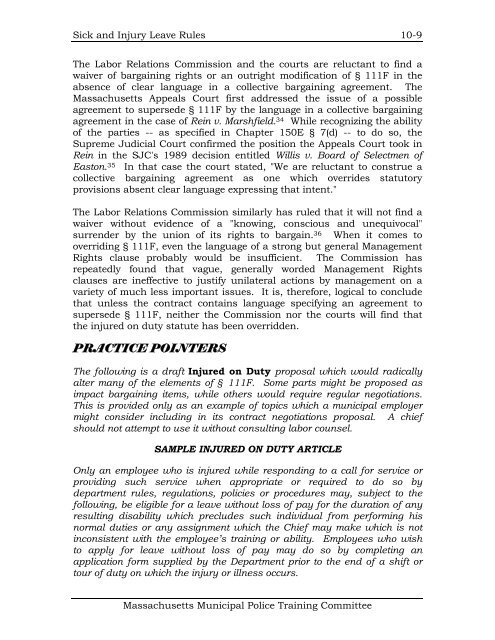Management Rights - AELE's Home Page
Management Rights - AELE's Home Page
Management Rights - AELE's Home Page
You also want an ePaper? Increase the reach of your titles
YUMPU automatically turns print PDFs into web optimized ePapers that Google loves.
Sick and Injury Leave Rules 10-9<br />
The Labor Relations Commission and the courts are reluctant to find a<br />
waiver of bargaining rights or an outright modification of § 111F in the<br />
absence of clear language in a collective bargaining agreement. The<br />
Massachusetts Appeals Court first addressed the issue of a possible<br />
agreement to supersede § 111F by the language in a collective bargaining<br />
agreement in the case of Rein v. Marshfield. 34 While recognizing the ability<br />
of the parties -- as specified in Chapter 150E § 7(d) -- to do so, the<br />
Supreme Judicial Court confirmed the position the Appeals Court took in<br />
Rein in the SJC's 1989 decision entitled Willis v. Board of Selectmen of<br />
Easton. 35 In that case the court stated, "We are reluctant to construe a<br />
collective bargaining agreement as one which overrides statutory<br />
provisions absent clear language expressing that intent."<br />
The Labor Relations Commission similarly has ruled that it will not find a<br />
waiver without evidence of a "knowing, conscious and unequivocal"<br />
surrender by the union of its rights to bargain. 36 When it comes to<br />
overriding § 111F, even the language of a strong but general <strong>Management</strong><br />
<strong>Rights</strong> clause probably would be insufficient. The Commission has<br />
repeatedly found that vague, generally worded <strong>Management</strong> <strong>Rights</strong><br />
clauses are ineffective to justify unilateral actions by management on a<br />
variety of much less important issues. It is, therefore, logical to conclude<br />
that unless the contract contains language specifying an agreement to<br />
supersede § 111F, neither the Commission nor the courts will find that<br />
the injured on duty statute has been overridden.<br />
PRACTICE POINTERS<br />
The following is a draft Injured on Duty proposal which would radically<br />
alter many of the elements of § 111F. Some parts might be proposed as<br />
impact bargaining items, while others would require regular negotiations.<br />
This is provided only as an example of topics which a municipal employer<br />
might consider including in its contract negotiations proposal. A chief<br />
should not attempt to use it without consulting labor counsel.<br />
SAMPLE INJURED ON DUTY ARTICLE<br />
Only an employee who is injured while responding to a call for service or<br />
providing such service when appropriate or required to do so by<br />
department rules, regulations, policies or procedures may, subject to the<br />
following, be eligible for a leave without loss of pay for the duration of any<br />
resulting disability which precludes such individual from performing his<br />
normal duties or any assignment which the Chief may make which is not<br />
inconsistent with the employee’s training or ability. Employees who wish<br />
to apply for leave without loss of pay may do so by completing an<br />
application form supplied by the Department prior to the end of a shift or<br />
tour of duty on which the injury or illness occurs.<br />
Massachusetts Municipal Police Training Committee
















